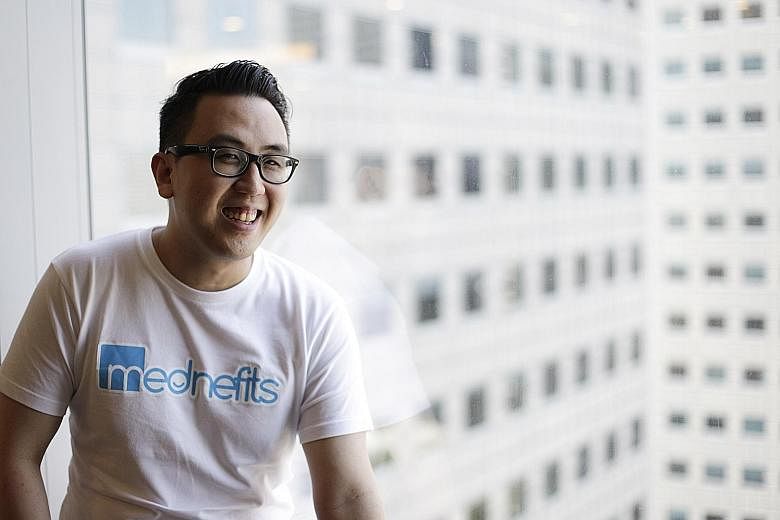Q Tell me how Mednefits got started.
A I had previously been working with a large insurance company for five years. In early 2015, my grandmother fell ill. The father of my fellow co-founder, Mr Hadiyanto Wibawa, was also ill at around the same time. They were both not covered by insurance as my grandmother did not work and his father was in an SME.
Without insurance, we realised that the bills were crazy. My grandmother's bill was about $50,000 so my parents and relatives used up their Medisave accounts to pay for her hospitalisation bills.
Furthermore, working at an insurance company, I got a lot of inquiries from SMEs. They wanted an insurance product for employees, but insurance products are usually one-size-fits-all, and they are usually more expensive for SMEs compared with MNCs, as the latter have economies of scale.
After we studied the whole model, we realised that there are a lot of middlemen and third-party administrators which take a cut from healthcare costs.
We started Mednefits because we saw a gap in the market. Traditional insurance plans require a company to take up hospitalisation coverage before they can cover the employees for outpatient expenses. In contrast, Mednefits caters directly to the basic outpatient needs of employees by pooling SMEs together and getting corporate rates from healthcare providers. These corporate rates had previously been available only to MNCs.
We use technology to replace middlemen and connect healthcare providers directly with companies.
Q What were the challenges you faced?
A We did not know how clinics work. In early 2015, Hadi and I went to work in clinics as part-time nurses for three months to understand their pain points.
We took almost a year to sign up the first 10 clinics.
We needed to understand their operation needs, according to the workflow. The pitch got easier after we could offer them the same rates as third-party administrators, and leverage on our technology platform.
Q How did you benefit from joining two incubator programmes?
A We joined the Singapore Management University incubator in November 2015, and Singapore Institute of Management's Platform E in March this year.
When we first started, we wanted to build a business but we had no clue how to scale the business, or of marketing, branding and financial modelling. We got help in these areas when we joined the incubators.
We also met our current chief technology officer via the Singapore Management University demo day. After he joined our team, we were able to speed up our IT solution and come up with a simple and easy-to-use tech platform, which went operational last July. Previously, we outsourced our IT team, which charged us for every single change that we made, reducing our ability to move nimbly.
Q How did you manage to grow amid tough competition from the big insurance players?
A Unlike traditional insurance agencies, we provide a free health-benefits platform that helps lower healthcare costs of companies by up to 60 per cent when they appoint us as their insurance provider.
Using our technology, we are able to replace existing middlemen and pass the savings directly on to our SME customers.
We have about 180 SMEs as our customers, and a network of more than 250 clinics. We have several clinic chains on board, such as OneCare Medical, Dr Chua & Partners, and Idental and Chinese Medical Centre.
Q How has your profitability and growth been? What are your expansion plans?
A We have grown five times since 2016, and our current brokerage business is profitable and cash flow positive. We did not make insurance sales in 2015 due to a non-compete clause by my previous employer.
For the next two years, we aim to serve the majority of SMEs and the self-employed in Singapore. As SMEs make up the majority of Singapore's economy, the potential is great if we are able to design a benefits programme that is able to serve SMEs' budgets and needs.
We want to sign up 400 healthcare partners islandwide, and have future plans to expand to other countries in South-east Asia.


